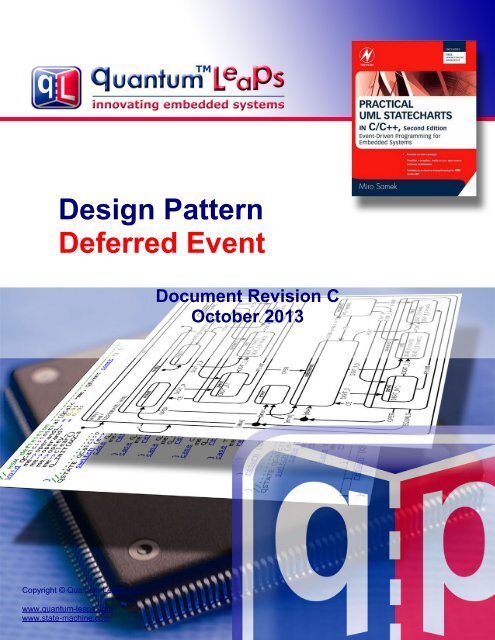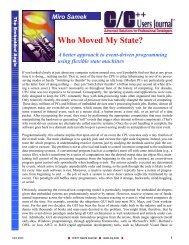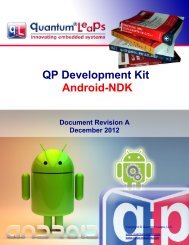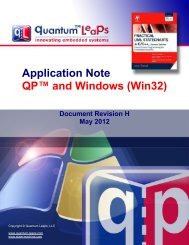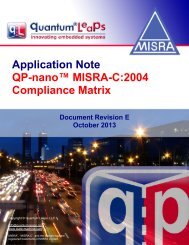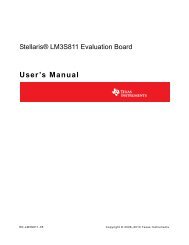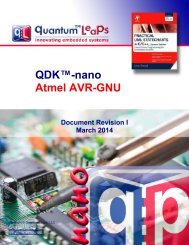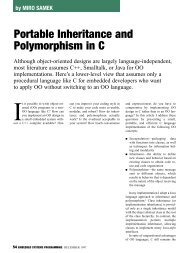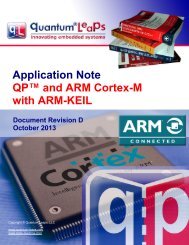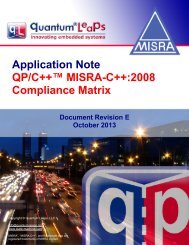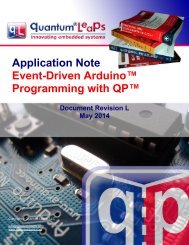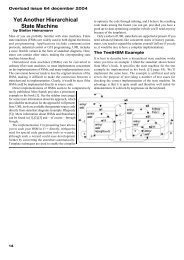Deferred Event - Quantum Leaps
Deferred Event - Quantum Leaps
Deferred Event - Quantum Leaps
Create successful ePaper yourself
Turn your PDF publications into a flip-book with our unique Google optimized e-Paper software.
QP state machine framework patternDesign Pattern<strong>Deferred</strong> <strong>Event</strong>Document Revision COctober 2013Copyright © <strong>Quantum</strong> <strong>Leaps</strong>, LLCwww.quantum-leaps.comwww.state-machine.com
Design Pattern<strong>Deferred</strong> <strong>Event</strong>state-machine.com/resources/appnotes.phpNote:Even though the deferred event is in principle available directly from the recall() operation, it is notprocessed in the entry action to “idle”. Rather, the recall() operation posts the event to self (to theevent queue of this state machine). The state machine then handles the NEW_REQUEST event as anyother event, that is, in the transition from “idle” to “receiving”.Sample CodeThe sample code for the <strong>Deferred</strong> <strong>Event</strong> state pattern is found in the directoryqpc\examples\win32\mingw\defer\. You can execute the application by double-clicking on the fileDEFER.EXE file in the dbg\ subdirectory. Figure 5.7 shows the output generated by the DEFER.EXEapplication. The application prints every state entry (to “idle”, “receiving”, and “authorizing”). Additionally, youget notification of every NEW_REQUEST event and whether it has been deferred or processed directly. Yougenerate new requests by pressing the ‘n’ key. Please note that request #7 is NOT deferred because the deferredevent queue gets full. Please see the explanation section following Listing 5.3 for an overview of options tohandle this situation.Figure 5.7 Annotated output generated by DEFER.EXE.Listing 5.3 The <strong>Deferred</strong> <strong>Event</strong> sample code (file defer.c).Copyright © <strong>Quantum</strong> <strong>Leaps</strong>, LLC. All Rights Reserved.3 of 9
Design Pattern<strong>Deferred</strong> <strong>Event</strong>state-machine.com/resources/appnotes.php(1) #include "qp_port.h"#include "bsp.h"/*..........................................................................*/enum TServerSignals {NEW_REQUEST_SIG = Q_USER_SIG, /* the new request signal */RECEIVED_SIG, /* the request has been received */AUTHORIZED_SIG, /* the request has been authorized */TERMINATE_SIG /* terminate the application */};/*..........................................................................*/(2) typedef struct RequestEvtTag {Q<strong>Event</strong> super; /* derive from Q<strong>Event</strong> */uint8_t ref_num; /* reference number of the request */} RequestEvt;/*..........................................................................*/(3) typedef struct TServerTag { /* Transaction Server active object */(4) QActive super; /* derive from QActive */(5) QEQueue requestQueue; /* native QF queue for deferred request events */(6) Q<strong>Event</strong> const *requestQSto[3]; /* storage for the deferred queue buffer */(7) QTimeEvt receivedEvt; /* private time event generator */(8) QTimeEvt authorizedEvt; /* private time event generator */} TServer;void TServer_ctor(TServer *me); /* the default ctor *//* hierarchical state machine ... */QState TServer_initial (TServer *me, Q<strong>Event</strong> const *e);QState TServer_idle (TServer *me, Q<strong>Event</strong> const *e);QState TServer_busy (TServer *me, Q<strong>Event</strong> const *e);QState TServer_receiving (TServer *me, Q<strong>Event</strong> const *e);QState TServer_authorizing(TServer *me, Q<strong>Event</strong> const *e);QState TServer_final (TServer *me, Q<strong>Event</strong> const *e);/*..........................................................................*/void TServer_ctor(TServer *me) { /* the default ctor */QActive_ctor(&me->super, (QStateHandler)&TServer_initial);(9) QEQueue_init(&me->requestQueue,me->requestQSto, Q_DIM(me->requestQSto));QTimeEvt_ctor(&me->receivedEvt, RECEIVED_SIG);QTimeEvt_ctor(&me->authorizedEvt, AUTHORIZED_SIG);}/* HSM definition ----------------------------------------------------------*/QState TServer_initial(TServer *me, Q<strong>Event</strong> const *e) {(void)e; /* avoid the compiler warning about unused parameter */return Q_TRAN(&TServer_idle);}/*..........................................................................*/QState TServer_final(TServer *me, Q<strong>Event</strong> const *e) {(void)me; /* avoid the compiler warning about unused parameter */switch (e->sig) {case Q_ENTRY_SIG: {printf("final-ENTRY;\nBye!Bye!\n");BSP_exit(); /* terminate the application */return Q_HANDLED();Copyright © <strong>Quantum</strong> <strong>Leaps</strong>, LLC. All Rights Reserved.4 of 9
Copyright © <strong>Quantum</strong> <strong>Leaps</strong>, LLC. All Rights Reserved.Design Pattern<strong>Deferred</strong> <strong>Event</strong>state-machine.com/resources/appnotes.php}}return Q_SUPER(&QHsm_top);}/*..........................................................................*/QState TServer_idle(TServer *me, Q<strong>Event</strong> const *e) {switch (e->sig) {case Q_ENTRY_SIG: {RequestEvt const *rq;printf("idle-ENTRY;\n");/* recall the request from the private requestQueue */(10) rq = (RequestEvt const *)QActive_recall((QActive *)me,&me->requestQueue);if (rq != (RequestEvt *)0) { /* recall posted an event? */(11) printf("Request #%d recalled\n", (int)rq->refNum);}else {(12) printf("No deferred requests\n");}return Q_HANDLED();}case NEW_REQUEST_SIG: {printf("Processing request #%d\n",(int)((RequestEvt const *)e)->refNum);return Q_TRAN(&TServer_receiving);}case TERMINATE_SIG: {return Q_TRAN(&TServer_final);}}return Q_SUPER(&QHsm_top);}/*..........................................................................*/QState TServer_busy(TServer *me, Q<strong>Event</strong> const *e) {switch (e->sig) {case NEW_REQUEST_SIG: {(13) if (QEQueue_getNFree(&me->requestQueue) > 0) { /* can defer? *//* defer the request */(14) QActive_defer((QActive *)me, &me->requestQueue, e);printf("Request #%d deferred;\n",(int)((RequestEvt const *)e)->ref_num);}else {/* notify the request sender that the request was ignored.. */(15) printf("Request #%d IGNORED;\n",(int)((RequestEvt const *)e)->ref_num);}return Q_HANDLED();}case TERMINATE_SIG: {return Q_TRAN(&TServer_final);}}return Q_SUPER(&QHsm_top);}5 of 9
Design Pattern<strong>Deferred</strong> <strong>Event</strong>state-machine.com/resources/appnotes.php/*..........................................................................*/QState TServer_receiving(TServer *me, Q<strong>Event</strong> const *e) {switch (e->sig) {case Q_ENTRY_SIG: {printf("receiving-ENTRY;\n");/* one-shot timeout in 1 second */QTimeEvt_fireIn(&me->receivedEvt, (QActive *)me,BSP_TICKS_PER_SEC);return Q_HANDLED();}case Q_EXIT_SIG: {QTimeEvt_disarm(&me->receivedEvt);return Q_HANDLED();}case RECEIVED_SIG: {return Q_TRAN(&TServer_authorizing);}}return Q_SUPER(&TServer_busy);}/*..........................................................................*/QState TServer_authorizing(TServer *me, Q<strong>Event</strong> const *e) {switch (e->sig) {case Q_ENTRY_SIG: {printf("authorizing-ENTRY;\n");/* one-shot timeout in 2 seconds */QTimeEvt_fireIn(&me->authorizedEvt, (QActive *)me,2*BSP_TICKS_PER_SEC);return Q_HANDLED();}case Q_EXIT_SIG: {QTimeEvt_disarm(&me->authorizedEvt);return Q_HANDLED();}case AUTHORIZED_SIG: {return Q_TRAN(&TServer_idle);}}return Q_SUPER(&TServer_busy);}(1) The <strong>Deferred</strong> <strong>Event</strong> state pattern relies heavily on event queuing, which is not supported by the raw QEPevent processor. The sample code uses the whole QP, which includes the QEP event processor and theQF real-time framework. QF provides specific direct support for deferring and recalling events.(2) The RequestEvt event has a parameter ref_num (reference number) that uniquely identifies therequest.(3-4) The transaction server (TServer) state machine derives from the QF class QActive that combines aHSM, an event queue, and a thread of execution. The QActive class actually derives from QHsm,which means that TServer also indirectly derives from QHsm.(5) The QF real-time framework provides a “raw” thread-safe event queue class QEQueue that is needed toimplement event deferral. Here the TServer state machine declares the private requestQueue eventqueue to store the deferred request events. The QEQueue facility is discussed in Section 7.8.3 ofChapter 7.Copyright © <strong>Quantum</strong> <strong>Leaps</strong>, LLC. All Rights Reserved.6 of 9
Design Pattern<strong>Deferred</strong> <strong>Event</strong>state-machine.com/resources/appnotes.php(6) The QEQueue requires storage for the ring buffer, which the user must provide, because only theapplication designer knows how to size this buffer. Please note that event queues in QF store justpointers to Q<strong>Event</strong>, not the whole event objects.(7-8) The delays of receiving the whole transaction request (RECEIVED) and receiving the authorizationnotification (AUTHORIZED) are modeled in this example with the time events provided in QF.(9) The private requestQueue event queue is initialized and given its buffer storage.(10) Per the HSM design, the entry action to the “idle” state recalls the request events. The functionQActive_recall() returns the pointer to the recalled event, or NULL if no event is currentlydeferred.Note:Even though you can “peek” inside the recalled event, you should not process it at this point. By the timeQActive_recall() function returns, the event is already posted to the active object’s event queueusing the last-in-first-out (LIFO) policy, which guarantees that the recalled event will be the very next toprocess. (If other events were allowed to overtake the recalled event, the state machine might transitionto a state where the recalled event would no longer be convenient.) The state machine will then handlethe event like any other request coming at the convenient time. This is the central point of the <strong>Deferred</strong><strong>Event</strong> design pattern.(11-12) The recalled event is inspected only to notify the user, but not to handle it.(13) Before the “busy” superstate defers the request, it checks if the private event queue can accept a newdeferred event.(14) If so, the event is deferred by calling the QActive_defer() QF function.(15) Otherwise, the request is ignored and the user is notified about this fact.Note:Losing events like this is often unacceptable. In fact, the default policy of QF is to fail an internalassertion whenever an event could be lost. In particular, the QActve_defer() function would fire aninternal assertion if the event queue could not accept the deferred event. You can try this option bycommenting out the if-statement in Listing 5.3(13).Figure 5.8 shows a variation of the <strong>Deferred</strong> <strong>Event</strong> state pattern, in which the state machine has the“canonical” structure recommended by the Ultimate Hook pattern. The “busy” state becomes the superstate of allstates, including “idle”. The “idle” substate overrides the NEW_REQUEST event. All other substates of “busy”rely on the default event handling inside the “busy” superstate, which defers the NEW_REQUEST event. You canvery easily try this option by re-parenting the “idle” state. You simply change “return(QState)&QHsm_top” to “return (QState)&TServer_busy” in the TServer_idle() statehandler function.Figure 5.8 A variation of the <strong>Deferred</strong> <strong>Event</strong> state pattern.Copyright © <strong>Quantum</strong> <strong>Leaps</strong>, LLC. All Rights Reserved.7 of 9
Design Pattern<strong>Deferred</strong> <strong>Event</strong>state-machine.com/resources/appnotes.phpFinally, I’d like to point out the true convenience of the QActive_defer() andQActive_recall() functions. The main difficulty in implementing the event deferral mechanism is actuallynot the explicit deferring and recalling, but rather the memory management for the event objects. Consider, forexample, that each request event must occupy some unique memory location, yet you don’t know how long theevent will be used. Some request events could be recycled just after the run-to-completion (RTC) step of theTServer state machine, but some will be deferred and thus will be used much longer. Please recall that formemory efficiency and best performance the deferred event queue, as well as the queues of active objects in QF,store only pointers to events, not the whole event objects. How do you organize and manage memory for events?This is where the QF real-time framework comes in. QF takes care of all the nitty-gritty details ofmanaging event memory and does it very efficiently with “zero-copy” policy and in a thread-safe manner. As Iwill explain in Chapter 7, QF uses efficient event pools combined with a standard reference counting algorithm toknow when to recycle events back to the pools. The functions QActive_defer() and QActive_recall()participate in the reference counting process, so that QF does not recycle deferred events prematurely.The whole event-management mechanism is remarkably easy to use. You dynamically allocate an event,fill in the event parameters and post it. QF takes care of the rest. In particular, you never explicitly recycle theevent. Listing 5.4 shows how the request events are generated in the sample code for the <strong>Deferred</strong> <strong>Event</strong> pattern.Listing 5.4 Generation of new request events with the Q_NEW() macro (file defer.c).void BSP_onConsoleInput(uint8_t key) {switch (key) {case 'n': { /* new request */static uint8_t reqCtr = 0; /* count the requests */(1) RequestEvt *e = Q_NEW(RequestEvt, NEW_REQUEST_SIG);(2) e->ref_num = (++reqCtr); /* set the reference number *//* post directly to TServer active object */(3) QActive_postFIFO((QActive *)&l_tserver, (Q<strong>Event</strong> *)e);break;}case 0x1B: { /* ESC key */(4) static Q<strong>Event</strong> const terminateEvt = { TERMINATE_SIG, 0};(5) QActive_postFIFO((QActive *)&l_tserver, &terminateEvt);break;}}}(1) When you press the ‘n’ key, the QF macro Q_NEW() creates new RequestEvt event and assigns itthe signal NEW_REQUEST_SIG. The new event is allocated from an “event pool” that the applicationallocates at startup.(2) You fill in the event parameters. Here the ref_num parameter is set from the incremented staticcounter.(3) You post the event to an active object, such as the local l_tserver object.(4) Constant, never changing events, can be allocated statically. Such events should have always thedynamic_ attribute set to zero (see Listing 4.2 and Section 4.3 in Chapter 4).(5) You post such static event just like any other event. The QF real-time framework knows not to managethe static events.Copyright © <strong>Quantum</strong> <strong>Leaps</strong>, LLC. All Rights Reserved.8 of 9
Design Pattern<strong>Deferred</strong> <strong>Event</strong>state-machine.com/resources/appnotes.phpConsequences<strong>Event</strong> deferral is a valuable technique for simplifying state models. Instead of constructing an unduly complexstate machine to handle every event at any time, you can defer an event when it comes at an inappropriate orawkward time. The event is recalled when the state machine is better able to handle it. The <strong>Deferred</strong> <strong>Event</strong> statepattern is a lightweight alternative to the powerful but heavyweight event deferral of UML statecharts. The<strong>Deferred</strong> <strong>Event</strong> state pattern has the following consequences.• It requires explicit deferring and recalling of the deferred events.• The QF real-time framework provides generic defer() and recall() operations.• If a state machine defers more than one event type, it might use the same event queue(QEQueue) or different event queues for each event type. The generic QF defer() andrecall() operations support both options.• <strong>Event</strong>s are deferred in a high-level state, often inside an internal transition in this state.• <strong>Event</strong>s are recalled in the entry action to the state that can conveniently handle the deferred eventtype.• The event should not be processed at the time it is explicitly recalled. Rather, the recall()operation posts it using the LIFO policy so that the state machine cannot change state beforeprocessing the event.• Recalling an event involves posting it to self; however, unlike the Reminder pattern, deferredevents in are usually external rather than invented.Known UsesThe Real-Time Object-Oriented Modeling (ROOM) method [Selic+ 94] supports a variation of the <strong>Deferred</strong><strong>Event</strong> pattern presented here. Just like the QF real-time framework, the ROOM virtual machine (infrastructure forexecuting ROOM models) provides the generic methods defer() and recall(), which clients need to callexplicitly. The ROOM virtual machine also takes care of event queuing. Operations defer() and recall() inROOM are specific to the interface component through which an event was received.Copyright © <strong>Quantum</strong> <strong>Leaps</strong>, LLC. All Rights Reserved.9 of 9


